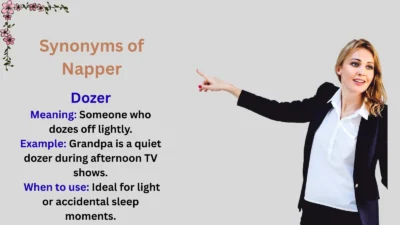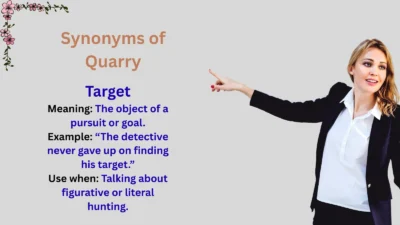Synonyms of debuff, such as weaken, hinder, impair, and diminish, describe actions that reduce power, strength, or effectiveness—especially in gaming or competitive contexts. For example, “weaken” shows a loss of strength, while “hinder” focuses on slowing down or limiting ability. These words capture different ways of lowering performance, whether in games, systems, or real-life situations.
If you’re writing about gaming, strategy, or performance analysis, using the right synonym for debuff helps you express effects and challenges more clearly.
These synonyms of debuff make your language sharper and more dynamic. From role-playing games to everyday speech, the right term helps describe moments when something—or someone—loses their edge.
What Does Debuff Mean?
In simple terms, a debuff means a negative effect that reduces ability, strength, or efficiency. It’s often used in gaming to describe:
- A spell or effect that weakens a character
- A condition that lowers performance or stats
- A disadvantage caused by an opponent
- Any reduction in power or effectiveness
Beyond gaming, debuff can also describe anything that holds someone back—like fatigue, distraction, or stress. It’s the opposite of a buff, showing how even small setbacks can change performance.
30 Synonyms & Related Words for Debuff (And When to Use Them)
1. Weakening
Meaning: Reducing strength or effectiveness.
Example: “The enemy’s spell caused a weakening effect on the entire squad.”
Use When: Describing gradual or overall loss of power — physical, magical, or emotional.
2. Penalty
Meaning: A disadvantage or punishment applied for an action.
Example: “The player received a penalty that halved their movement speed.”
Use When: Referring to consequences or rule-based punishments (common in gaming or sports).
3. Curse
Meaning: A magical or symbolic debuff that brings harm or misfortune.
Example: “The old amulet carried a curse that drained his vitality.”
Use When: Writing fantasy, magic, or folklore with emotional or supernatural tones.
4. Deterioration
Meaning: Gradual decline in quality or condition.
Example: “Over time, the armor suffered from deterioration.”
Use When: You want a slow, natural process of weakening rather than an instant effect.
5. Drain
Meaning: A loss of energy or resources.
Example: “The mana drain reduced her ability to cast spells.”
Use When: Describing resource depletion — stamina, energy, or emotional strength.
6. Hindrance
Meaning: Something that prevents or slows progress.
Example: “The poison acted as a hindrance to his recovery.”
Use When: Emphasizing obstacles rather than direct weakening.
7. Paralyze
Meaning: To severely limit or disable the ability.
Example: The sudden attack paralyzed the defense system, leaving it vulnerable.
Use When: You want a dramatic, severe tone — a strong version of “debuff.”
8. Impairment
Meaning: A reduction in function or performance.
Example: “The frost caused movement impairment.”
Use When: Describing medical, mechanical, or technical forms of weakening.
9. Malus
Meaning: A negative modifier (often used in RPGs).
Example: “The weapon comes with a power boost but also a speed malus.”
Use When: Writing about gaming stats or tabletop systems with technical terms.
10. Downgrade
Meaning: A reduction in quality or effectiveness.
Example: “After the patch, the hero’s ability received a major downgrade.”
Use When: Discussing balance changes, updates, or performance reductions.
11. Disadvantage
Meaning: A position or effect that puts someone at an advantage.
Example: “The debuff placed the team at a serious disadvantage.”
Use When: Focusing on strategy or fairness rather than emotion.
12. Depletion
Meaning: The exhaustion of energy, stamina, or resources.
Example: “Continuous use of magic led to mana depletion.”
Use When: Showing total or gradual exhaustion rather than direct harm.
13. Restriction
Meaning: A limit on actions or capabilities.
Example: “The paralysis imposed a movement restriction.”
Use When: The effect limits rather than damages.
14. Inhibition
Meaning: Something that restrains or suppresses a process.
Example: “The fear acted as an inhibition to her powers.”
Use When: Writing psychological or internal limitations.
15. Ailment
Meaning: A mild illness or affliction.
Example: “The plague status added an ailment to all party members.”
Use When: Talking about health-based debuffs in games or metaphors.
16. Affliction
Meaning: A condition causing pain or suffering.
Example: “The curse inflicted a dark affliction on the hero.”
Use When: Describing emotional, magical, or spiritual suffering.
17. Injury
Meaning: Physical harm or damage.
Example: “The battle left him with an injury that slowed his attack speed.”
Use When: The weakening comes from physical harm.
18. Debilitation
Meaning: A condition that weakens or incapacitates.
Example: “The toxin caused severe debilitation.”
Use When: Writing about health, disease, or lasting weakness.
19. Erosion
Meaning: Gradual wearing away or decay.
Example: “Corruption led to the slow erosion of his powers.”
Use When: You want a poetic or long-term image of decline.
20. Suppression
Meaning: Forcing something down or preventing its full potential.
Example: “The silence spell caused ability suppression.”
Use When: The effect blocks or silences powers.
21. Stun
Meaning: Temporarily disabling or shocking someone into immobility.
Example: “The flashbang caused a stun effect.”
Use When: The debuff is brief but impactful.
22. Paralysis
Meaning: Complete inability to move or act.
Example: “The venom induced paralysis in the target.”
Use When: You want to show total immobilization — literal or metaphorical.
23. Corruption
Meaning: Decay or taint spreading through something pure.
Example: “Dark energy caused corruption in the kingdom’s core.”
Use When: Writing fantasy, evil forces, or moral decay.
24. Sabotage
Meaning: Intentional interference or damage.
Example: “The hacker’s virus acted as a debuff through system sabotage.”
Use When: There’s deliberate human or AI intent behind the weakening.
25. Decay
Meaning: Natural breakdown over time.
Example: “Without maintenance, the structure fell into decay.”
Use When: You want a natural, atmospheric weakening.
26. Downtime
Meaning: Temporary period of inactivity or reduced performance.
Example: “The system’s downtime acted as a technical debuff.”
Use When: Writing about technology, machinery, or productivity.
27. Exhaustion
Meaning: Complete depletion of energy or stamina.
Example: “The character’s exhaustion reduced her attack speed.”
Use When: Emphasizing fatigue or burnout as a limiting factor.
28. Diminishment
Meaning: A reduction in size, importance, or power.
Example: “The new potion caused a diminishment in magical defense.”
Use When: You want a subtle, elegant term for reduced strength.
29. Fatigue
Meaning: Tiredness reduces one’s efficiency.
Example: “Battle fatigue lowered the warrior’s precision.”
Use When: The weakening stems from overuse or stress.
30. Debilitate
Meaning: To weaken or reduce strength or effectiveness.
Example: The virus can debilitate even the strongest players in the game.
Use When: There’s a deliberate or balanced challenge involved.
How to Choose the Right Synonym
Choosing the best synonym for “debuff” depends on tone, context, and intent:
| Context | Best Synonyms | Tone/Use Case |
| Gaming or RPGs | Malus, Stun, Weakening, Penalty | Technical, strategic language |
| Fantasy or Magic Writing | Curse, Affliction, Corruption, Suppression | Dramatic, mystical, emotional |
| Real-life or Metaphorical Use | Drain, Fatigue, Exhaustion, Inhibition | Every day struggles or emotions |
| Science or Medicine | Impairment, Debilitation, Ailment | Formal or clinical tone |
| Technology/Systems | Downtime, Sabotage, Depletion | Professional or technical contexts |
When choosing, ask yourself:
- Is the effect temporary or lasting? (“Stun” vs. “Erosion”)
- Is it physical or emotional? (“Injury” vs. “Inhibition”)
- Is it natural or intentional? (“Decay” vs. “Sabotage”)
Conclusion:
The synonyms of debuff, like weaken, hinder, impair, and diminish, help describe moments of reduced strength, lowered performance, or temporary setbacks. Each synonym shows a different way something can lose power—whether through exhaustion, obstacles, or strategic disadvantages.
Using the right synonym makes your writing clear and precise, whether you’re talking about gaming mechanics or real-life challenges. These words highlight how small limitations can have a big impact on performance and outcomes.
In the end, debuff isn’t just a gaming term—it’s a way to understand how strength, focus, and energy can be affected in any situation.



